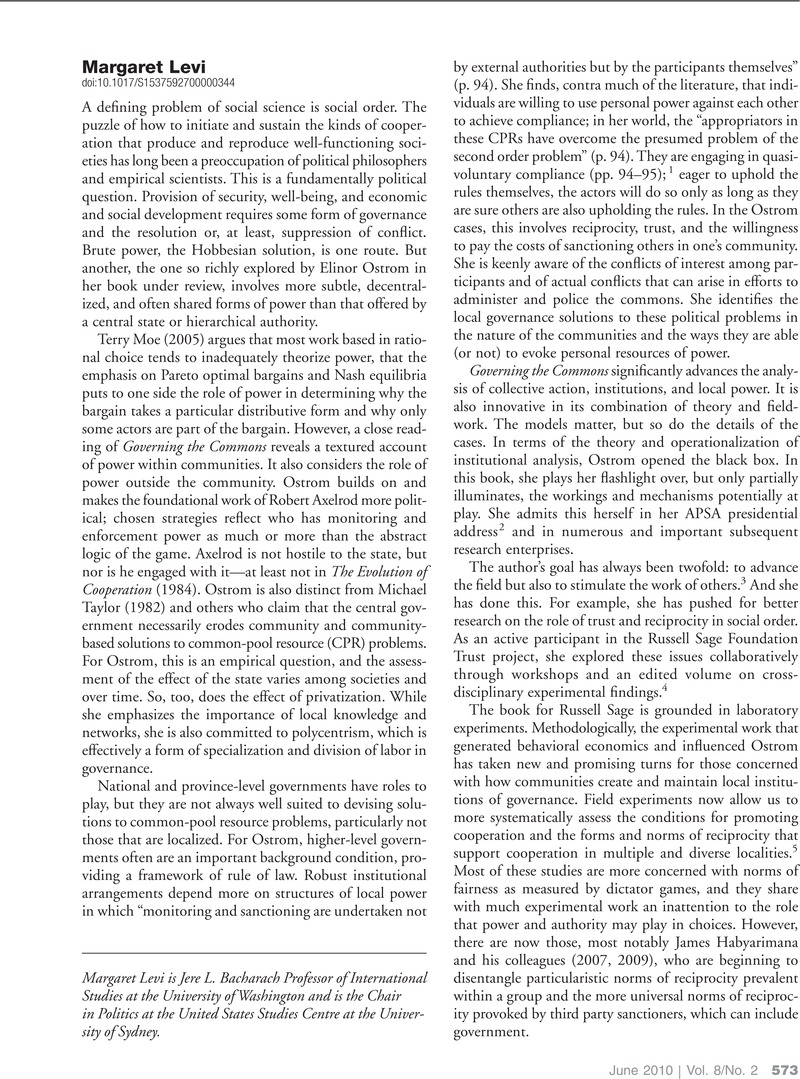No CrossRef data available.
Article contents
Beyond the Tragedy of the Commons: A Discussion of Governing the Commons: The Evolution of Institutions for Collective Action
Published online by Cambridge University Press: 17 June 2010
Abstract
An abstract is not available for this content so a preview has been provided. Please use the Get access link above for information on how to access this content.

- Type
- Review Symposium: Beyond the Tragedy of the Commons
- Information
- Copyright
- Copyright © American Political Science Association 2010
References
Cook, Karen S., and Emerson, Richard M.. 1978. “Power, Equity and Commitment in Exchange Networks.” American Sociological Review 43 (5): 721–39.CrossRefGoogle Scholar
Cook, Karen S., and Hardin, Russell. 2001. “Norms of Cooperativeness and Networks of Trust.” In Social Norms, ed. Hechter, Michael and Opp, Karl-Dieter. New York: Russell Sage Foundation, 327–47.Google Scholar
Cook, Karen S., Hardin, Russell, and Levi, Margaret. 2005. Cooperation Without Trust? New York: Russell Sage Foundation.Google Scholar
Farrell, Henry. 2004. “Trust, Distrust, and Power.” In Distrust, ed. Hardin, Russell. New York: Russell Sage Foundation, 85–105.Google Scholar
Farrell, Henry. 2009. The Political Economy of Trust. New York: Cambridge University Press.CrossRefGoogle Scholar
Farrell, Henry, and Knight, Jack. 2003. “Trust, Institutions and Institutional Change: Industrial Districts and the Social Capital Hypothesis.” Politics & Society 31 (4): 537–66.CrossRefGoogle Scholar
Habyarimana, James, Humphreys, Macartan, Posner, Daniel N., and Weinstein, Jeremy M.. 2007. “Why Does Ethnic Diversity Undermine Public Goods Provision?” American Political Science Review 101 (4): 709–25.CrossRefGoogle Scholar
Habyarimana, James, Humphreys, Macartan, Posner, Daniel N., and Weinstein, Jeremy M.. 2009. Coethnicity: Diversity and the Dilemmas of Collective Action. New York: Russell Sage Foundation.Google Scholar
Hechter, Michael. 1987. Principles of Group Solidarity. Berkeley: University of California Press.Google Scholar
Henrich, Joseph, Boyd, Robert, Bowles, Samuel, Camerer, Colin, Fehr, Ernst, and Eds, Herbert Gintis. 2004. Foundations of Human Sociality—Economic Experiments and Ethnographic Evidence from Fifteen Small-Scale Societies. New York: Oxford University Press.CrossRefGoogle Scholar
Moe, Terry. 2005. “Power and Political Institutions.” Perspectives on Politics 3 (2): 215–33.CrossRefGoogle Scholar
Ostrom, Elinor. 1998. “A Behavioral Approach to the Rational Choice Theory of Collective Action: Presidential Address, American Political Science Association, 1997.” American Political Science Review 92 (1): 1–22.CrossRefGoogle Scholar
Ostrom, Elinor. 2010. “A Long Polycentric Journey.” Annual Review of Political Science 13 (1): 1–23.CrossRefGoogle Scholar
Ostrom, Elinor, and Walker, James, eds. 2002. Trust and Reciprocity: Interdisciplinary Lessons for Experimental Research. New York: Russell Sage Foundation.Google Scholar
Taylor, Michael. 1982. Community, Anarchy and Liberty. Cambridge: Cambridge University Press.CrossRefGoogle Scholar




